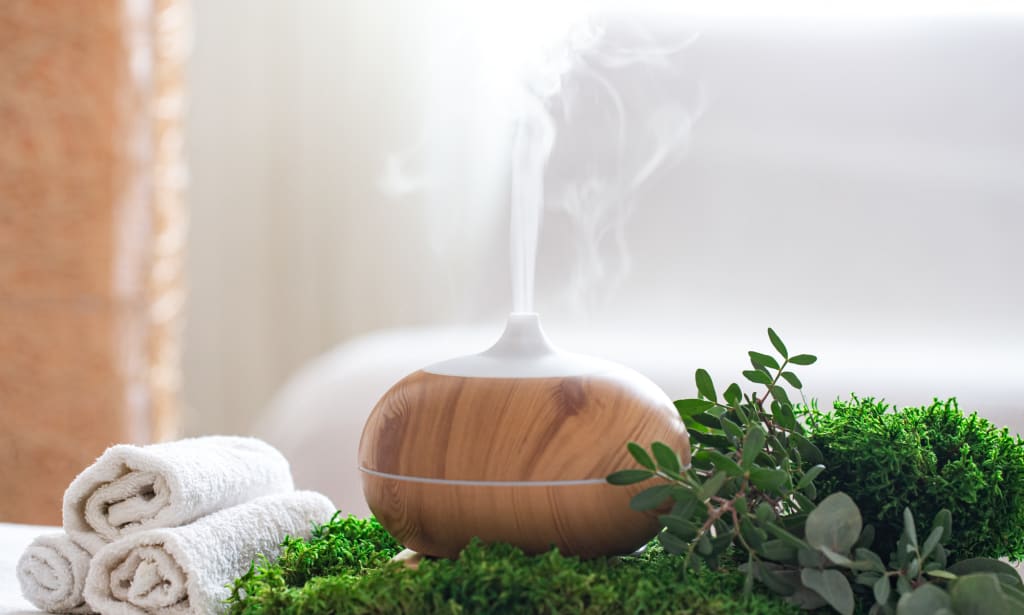Essential Oil Therapy
A Comprehensive Guide to Natural Healing

Essential oil therapy is a type of alternative medicine that uses plant extracts to promote physical, mental, and emotional health. It is a safe, non-invasive way to support the body’s natural healing processes and has been used for centuries by different cultures all around the world. In this article, we will explore the benefits of essential oil therapy, how it works, and how you can incorporate it into your daily routine.
What is Essential Oil Therapy?
Essential oil therapy, also known as aromatherapy, is the practice of using essential oils to promote health and well-being. Essential oils are extracted from plants through distillation or cold-pressing methods and contain the natural aroma and chemical properties of the plant. They are highly concentrated and can be used in a variety of ways, including inhalation, topical application, and ingestion.
How Does Essential Oil Therapy Work?
Essential oils work through the olfactory system, which is responsible for our sense of smell. When inhaled, essential oils stimulate the olfactory receptors in the nose, which send signals to the limbic system in the brain. The limbic system controls our emotions, memories, and behaviors, and essential oils can affect this system in different ways, depending on the oil used.
Essential oils can also be absorbed through the skin, where they enter the bloodstream and circulate throughout the body. This allows the oils to provide localized or systemic effects, depending on the application method.
Benefits of Essential Oil Therapy
There are many benefits to using essential oil therapy as part of your health and wellness routine. Some of these benefits include:
Many essential oils have calming and soothing properties that can help reduce feelings of stress and anxiety. Lavender, chamomile, and bergamot are all great oils to use for relaxation and stress relief.
Certain essential oils, such as peppermint and eucalyptus, have analgesic and anti-inflammatory properties that can help reduce pain and inflammation. These oils can be used topically or inhaled to provide relief for headaches, muscle aches, and joint pain.
Essential oils can also help improve the quality of your sleep by promoting relaxation and reducing feelings of anxiety. Some of the best oils to use for sleep include lavender, chamomile, and vetiver.
Essential oils can also help enhance your mood by promoting feelings of happiness and well-being. Citrus oils like orange and grapefruit are known for their uplifting properties, while ylang-ylang and jasmine can help promote feelings of relaxation and sensuality.
Many essential oils have antibacterial, antiviral, and antifungal properties that can help boost the immune system and protect against infections. Tea tree, oregano, and thyme are all great oils to use for immune support.
How to Use Essential Oils
There are many different ways to use essential oils, depending on your individual needs and preferences. Some of the most common methods include:
Inhalation
Inhalation is the most common way to use essential oils and involves either diffusing the oil into the air or inhaling the aroma directly from the bottle. This method is great for promoting relaxation, reducing stress, and improving mood.
Topical Application
Topical application involves applying the essential oil directly to the skin, usually in diluted form with a carrier oil. This method is great for localized pain relief, skin care, and immune support.
Ingestion
Ingestion involves adding the essential oil to food or beverages or taking it in capsule form. This method should only be done under the guidance of a trained aromatherapist or healthcare provider
Precautions and Safety
While essential oil therapy can be a safe and effective way to promote health and wellness, it is important to use caution and follow proper safety guidelines.
Some essential oils can be irritating or even toxic if used improperly, so it is important to do your research and consult with a trained aromatherapist or healthcare provider before using essential oils.
Here are some important safety tips to keep in mind when using essential oils:
- Always dilute essential oils with a carrier oil before applying them to the skin.
- Do a patch test before using a new essential oil to check for any allergic reactions or skin sensitivities.
- Avoid using essential oils on or near sensitive areas, such as the eyes, ears, or genitals.
- Do not ingest essential oils unless under the guidance of a trained aromatherapist or healthcare provider.
- Keep essential oils out of reach of children and pets.
Incorporating Essential Oil Therapy into Your Daily Routine
There are many ways to incorporate essential oil therapy into your daily routine, depending on your individual needs and preferences. Here are some ideas to get you started:
Diffuse calming oils like lavender or chamomile in your bedroom to promote relaxation and better sleep.
Add a few drops of peppermint or eucalyptus oil to a carrier oil and apply it to sore muscles for pain relief.
Use a citrus oil like grapefruit or bergamot in a diffuser or inhale directly from the bottle for a quick mood boost.
Add a few drops of tea tree or oregano oil to your cleaning products for a natural disinfectant.
Use a skin care product that contains essential oils, such as a facial serum or body lotion.
Conclusion
In conclusion, essential oil therapy is an effective and natural way to improve physical and mental wellbeing.
Its use dates back thousands of years, but modern research has shown that it can be used to improve mood, increase energy levels and even reduce pain from a variety of conditions.
It is important to note that essential oils should not be taken internally without the guidance of a healthcare professional.
Further research is needed to fully understand the benefits and potential risks associated with this ancient therapy.
FAQs
Are essential oils safe for everyone to use?
No, some essential oils can be toxic or irritating if used incorrectly, so before using essential oils, consult with a trained aromatherapist or healthcare provider.
Can essential oils cure diseases?
No, essential oils cannot cure diseases, but they can be used as a complementary therapy to support the body’s natural healing processes.
How do I know which essential oils to use?
The essential oils you use will be determined by your personal needs and preferences. Before using essential oils, it is critical to conduct research and consult with a trained aromatherapist or healthcare provider.
Can essential oils be used during pregnancy?
Some essential oils can be used safely during pregnancy, but you should always consult with your doctor before using any essential oils during pregnancy.
Can I ingest essential oils?
Ingesting essential oils should only be done under the guidance of a trained aromatherapist or healthcare provider, as some essential oils can be toxic if ingested in large amounts.
About the Creator
Lanz Jalal
I am a professional photographer, a foodie, a blogger, and a Singapore local Google guide. I love capturing the little details in life that make it worth living.






Comments
There are no comments for this story
Be the first to respond and start the conversation.